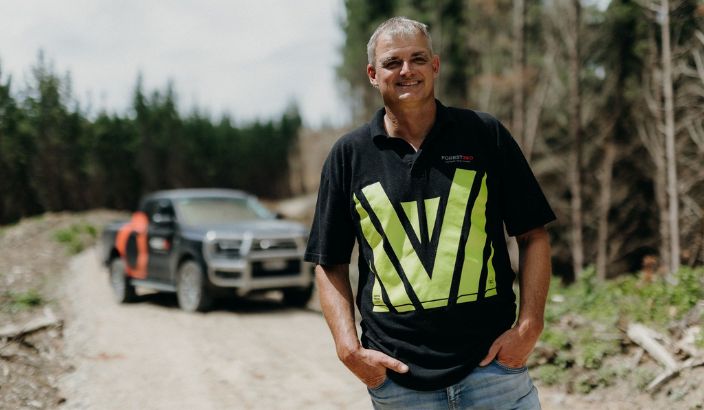Of Tesla shares and steel undies...

‘With technology advancing, the potential to develop new products is there. The industry has a strong future and is primed for change,’ says Marcus Musson, director of Forest360 and relatable forestry writer. Photo: Forest360.
Lines such as “The sentiment of this is playing out in the iron ore futures markets with a slide that would make Tesla shares look good,” or saying: “Time to get forestry’s steel undies out again,” are the kinds of phrases that make Marcus Musson, director at Forest360’s forestry reports and updates both popular and relatable.
“The problem in our game is there is a lot of jargon and industry specifics, so around five years ago I started to write some pieces for the Whanganui Chronicle that broke the jargon down and poked a bit of fun into it and it just took off,” Marcus says.
Although surprisingly Marcus has no formal writing training, he has a wealth of both formal and practical experience in forestry.
“Originally, I thought I might become a pharmacist when I was at school, but then I started running a timber treatment plant. During lunch breaks, we’d all sit around and look through the old Forestry Industry magazine with loads of cool logging gear, and I thought, ‘This is a cool industry,’” Marcus recalls.
“While working there, a guy came in to sell some logs who managed a few logging crews. We got talking, and I asked him how he got into it. He told me he had done a Bachelor of Forest Science, so I set off to do the same.”
After completing his four-year Bachelor of Forest Science, with honours, from Canterbury University, Marcus spent the next seven years in various forestry roles, including silviculture, managing harvest crews in Nelson and Tasman, and serving as Harvesting and Marketing manager for PF Olsen in Gisborne.
Eighteen years ago, he joined the Forest360 team, which was then known as Forest Owner Marketing Services (FOMS). Just 12 months into the role, he became shareholder and joined the board. “I like the practical side of forestry, the harvesting, machinery, and rural people,” he explains.
“It’s nice to have a mix of computer work one day and be in the bush the next.”
Compliance is currently one of Marcus’s biggest challenges. He notes that it is becoming increasingly difficult and expensive, with many people overseeing compliance for the regulators lacking practical experience, which only adds to the challenge.
Looking ahead, Marcus says the industry must explore alternative products.
“Things are changing rapidly with China’s building downturn, which is unlikely to improve in the medium to long term, so we need to look at alternatives for our supply volumes.”
Marcus says that in addition to low demand from China, there are opportunities all around the world as companies move away from coal and gas for industrial process heat.
“There’s a growing focus on alternative fuels in the forms of syngas and wood pellets. As well as bio-based plastics replacing traditional plastics with bioplastics made from wood, which both offer promising opportunities.
With technology advancing, the potential to develop new products is there. The industry has a strong future and is primed for change; we have the alternative resource available to meet new demands, it’s growing all around us.”
